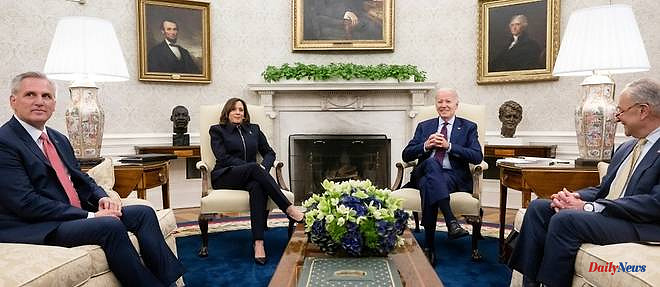Joe Biden said on Tuesday he was optimistic about the possibility of avoiding a default by the United States, which could occur in two weeks, but he had to cut short his planned diplomatic trip to Asia to focus on negotiations.
"There remains work on several difficult issues," but Joe Biden is "optimistic" that a "reasonable budget deal will be reached," the White House said in a statement.
The American president will meet again this week by telephone with the main officials of Congress. He will see them again in person after returning on Sunday from a trip to Japan for the G7 meeting.
A sign of the urgency and difficulty of the discussions, Joe Biden has canceled the major diplomatic tour he was to make in the wake of Papua New Guinea and Australia, the White House announced.
On the Republican side, on the other hand, the tone was more cautious. This meeting was "a little more productive" than the previous one, on May 9, said Kevin McCarthy, Republican leader of the House of Representatives, held by a narrow conservative majority.
On him depends, in large part, the short-term financial destiny of the United States.
"Our positions are still far apart, but what has changed during this meeting is that the president has selected two people from his administration to negotiate directly with us," he told reporters. in Congress.
"That doesn't mean we're going to come to an agreement", but that "the process is improved", he said.
However, "I am not more optimistic," said Kevin McCarthy, two weeks before the fateful date of a possible default in payment by the world's largest economy, an unprecedented scenario with potentially dramatic consequences.
The leader of the Senate Democrats, Chuck Schumer, reminded him that a default would be "the worst alternative".
In the context of a presidential campaign, and generally of great political tension, neither the American president, candidate for a second term, nor the conservative tenor McCarthy, wants to be the first to blink.
The White House has multiplied warnings about a possible default, a situation in which the federal state would be unable to pay a single penny, whether to pay salaries, pay benefits social, repay its creditors.
It would be "catastrophic" and "devastating for America and, to put it bluntly, the whole world," Joe Biden said in a video posted on Twitter ahead of the meeting.
This unprecedented scenario of an American payment default threatens on June 1 if no agreement is reached in Congress to raise the authorized public debt ceiling.
“We urge that an agreement be reached quickly so that the country can avoid this potentially devastating scenario”, urge more than 140 CEOs of American companies, including those of the giants Pfizer, Morgan Stanley, or even Goldman Sachs, in a letter open letter sent Tuesday to White House and congressional officials.
The parliamentary calendar further complicates the matter. The House of Representatives and the Senate, which together make up Congress, and which must likewise vote on the debt, only sit at the same time, until June 1, for four days.
The American Congress must regularly - it is a specificity of the country - raise the maximum ceiling of public debt.
However, the Republicans of Kevin McCarthy refuse to vote in this direction as long as Joe Biden does not accept significant budget cuts.
Officially, the White House refuses to negotiate on raising the debt ceiling, a routine procedure for a long time and which, according to Joe Biden, should not be politicized since the debt has been accumulated by governments on both sides.
But, in reality, several options are on the table.
Republicans and Democrats could thus agree that several tens of billions of dollars planned to respond to the Covid-19 pandemic, but never used, be canceled, so as to reduce public spending.
Also under discussion, according to the American press: the allocation of permits in the energy sector, and the tightening of the conditions for the allocation of certain social benefits.
This last option arouses the indignation of some elected Democrats on the most left, for example Senator Elizabeth Warren, who denounced Tuesday in the Capitol "a pure and simple attempt to deprive people of benefits on which they depend to survive."
17/05/2023 07:05:19 - Washington (AFP) - © 2023 AFP












